Have you ever wondered, can dogs eat blueberries? Blueberries are one of the best fruits that dogs can eat. This flavorful little superfood packs quite a nutritious punch loaded with vitamins, minerals, and other nutrients.
"Superfood" has become part of the modern lexicon when we talk about highly concentrated, nutritious foods (e.g., berries, avocadoes, leafy greens). But not everyone knows what it means. It's not a food group or a scientific term, and it doesn't mean that the food contains everything you need for a healthy diet.
But it does allow you to fly like Superman. Just kidding.
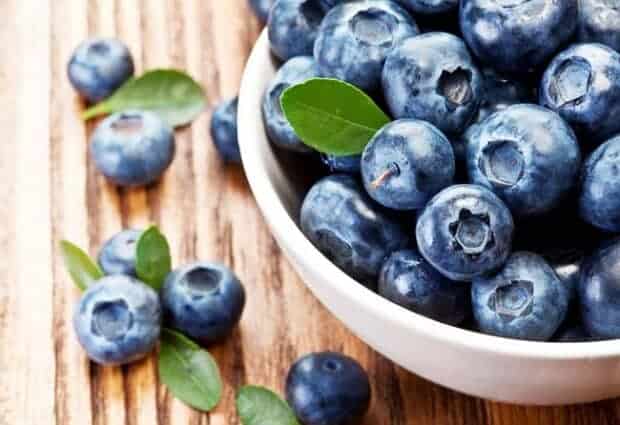
"Superfood" is simply a generic term attached to foods containing copious amounts of nutrients, even in small servings. They have been scientifically proven to be essential and incredibly beneficial to the body's overall health. So technically, if it's healthy, it can be a superfood.
One such food is blueberry. So next time you're snacking on some, share a handful with your dog. The additional nutrition to your dog's diet from a daily blueberry treat is virtually incalculable.

How are blueberries good for dogs?
Blueberries are hard to beat when it comes to nutrients per volume. They help keep your dog hydrated, reduce the risks associated with several diseases and cancers, and contain many antioxidant and anti-inflammatory properties.
Blueberries are also cholesterol-free and low in protein and fat. As a result, they provide all their health benefits without filling up your dog's tummy. This leaves plenty of room for the regular dry food meals important in dogs' bodies' structural and neurological development.
The following is a list of the primary nutritional components in blueberries and how they keep dogs healthy:
Fiber
High-quality, plant-based dietary fiber should always be at the top of your dog's nutritional needs list. It efficiently aids the digestive system in breaking down foods and mitigating the growth of harmful gut bacteria. In addition, healthy fiber is used to treat both constipation and diarrhea.
Fiber is also essential in the weight control of dogs. As obesity is the leading cause of all canine illnesses, this is key to providing long and healthy life. Adding more fiber to the diet will cause your dog to get full quicker, even while eating fewer calories.
Manganese
Manganese is a micromineral that is necessary for the metabolic process and production of energy. It is also essential for joint health, as it maintains the joints' bones and cartilage. For elder dogs, it is vital to have plenty of manganese in their diet.
Polyphenols
Polyphenols are a lesser-known but equally important component of the overall nutrition in blueberries. Only found in fruits and vegetables, polyphenols are the kings of antioxidants.
Their job is to locate and destroy the disease-causing free radicals that roam around the body. Excessive amounts of free radicals can quickly cause health issues in your dog, just like in a human body.
Dogs, even more so than humans, are vulnerable to dangerous toxins that only antioxidants can remove. Just think of all the things that your dog licks, chews, and eats. Everything from household cleaners to chemically treated lawns can turn your dog's body into a minefield of free radicals.
Antioxidants like polyphenols are significant factors for reducing the risk of cancer and heart and bone disease, among other things. As your dog gets older, a solid diet that includes polyphenols becomes even more critical.
Potassium
Potassium maintains a necessary balance of fluid in the body, guaranteeing healthy muscle growth and function. The effects include increased motor skills, regular heartbeats, and increased blood flow.
Additionally, it increases metabolism, bone density, and cognitive functions. Potassium is a must for any healthy dog's diet.
Vitamin C
Vitamin C's antioxidant and anti-inflammatory properties, working with polyphenols, are well known and rightfully praised. It boosts the immune system, reduces cognitive decline in elder dogs, and rids the body of cancer-causing free radicals.
While dogs' bodies produce Vitamin C, physical and emotional stress can reduce the growth rate and amount of reserve. So if you notice symptoms of anxiety in your dog (skin issues are a significant cause), make sure that he is getting plenty of Vitamin C.
Vitamin K
The primary function of Vitamin K is as a blood coagulant. This means that it helps the blood clot. For this reason, it is often given to dogs when they ingest rat poison, which is an anticoagulant.
Vitamin K also works with calcium in the body to promote healthy bones and teeth. Especially in elder dogs, it is vital in combating the risks associated with osteoporosis and other bone diseases.

Can there be risks associated when dogs eat blueberries?
We've established a long list of positive nutritional aspects of blueberries. Now, let's talk about some possible negative issues that could occur when your dog eats blueberries.
Overindulgence - dogs can eat too many blueberries in one sitting
Like most fruits, blueberries contain natural sugars and starch, negatively affecting dogs way quicker than humans. In addition, after overindulging in blueberries, dogs have a tendency for an upset stomach, often followed by diarrhea.
Moderation is the key to maximizing the benefits of blueberries. Most dogs should be limited to a small handful per day.; larger breeds can handle more than that.
It helps to remember the 90/10 rule if you're unsure of the dog food to treat ration. This means that 90% of your dog's daily calorie intake should come from dog food; the extra 10% can come from treats like blueberries. Just be aware when you feed your dog blueberries and treat them as snacks rather than meals.
Processed/packaged blueberry foods
Avoid giving your dog any store-bought food that is not explicitly made for dogs. They contain ingredients (mainly from preservatives) that can be bad for a dog's body.
Only use fresh or frozen blueberries when feeding them to your dog. If you want to give them a fancier treat than just a berry, make it at home (check out some recipes below). That way, you'll know what is in your dog's treats.
Allergies
Though very rare, dogs can have allergic reactions to blueberries. When first giving blueberries to your dog, be on the lookout for signs of allergies, including coughing, sneezing, itching, and breathing trouble.

Recipes for blueberries that your dogs can eat
If your dogs are like mine, they'll eat fruits like blueberries anytime, anywhere, and anyway you give it to them. Most pups will immediately devour the sweet fruit without giving it a second thought. Freezing them is a great way to change up the texture and keep your dog cool.
However, there are times when a more delicate presentation is needed. Perhaps your dog needs a little help finishing his kibble, or maybe you are just feeling a little creative. Whatever the reason, it is always helpful to know various ways to turn blueberries into healthy treats.
Check out this list of quick and easy ways to prepare blueberry treats for your dog:
Mashed - In the occurrence that your dog isn't eating all his dog food, or when you want to make an extra yummy meal, add some blueberries to it. Mash the blueberries and mix them in with the dry food. I assure you that the dinner bowl will be licked spotlessly clean.
Smoothie - Blend blueberries and plain yogurt for a special smoothie dog treat. For additional benefits, add some other dog-friendly fruits or coconut water to the concoction.
Frozen Treats - For a cool and fun treat in the summer, you need blueberries, water, and ice trays/molds. Drop a few berries in the molds, and add water. After allowing them to freeze, you have new frozen blueberry treats to toss to your dog. You can add more nutrition by using coconut water or plain yogurt instead of or in addition to water.
If you’ve made our Frozen Blueberry and Yogurt Dog Treats recipe I would be so grateful if you would rate the recipe and let me know what you think in the comments below!
PrintFrozen Blueberry and Yogurt Dog Treats
Our Frozen Blueberry and Yogurt Dog Treats are the perfect icy treat for your 4-legged friend on a hot day!
Ingredients
2 cups full-fat Greek yogurt with zero additives or flavorings
1 cup frozen blueberries
1 tablespoon honey
¼ cup whole fresh blueberries, sliced in half
¼ cup hemp hearts
Instructions
In a blender combine Greek yogurt, frozen blueberries, and honey. Blend until smooth. Transfer to a silicone treat mold or ice cube tray.
Divide the halved blueberries amongst the trays and sprinkle the hemp hearts evenly over the top.
Freeze 6-8 hours or overnight until solid.
Notes
Serving size will vary from 2-3 treats per small dog to 6-8 treats for larger dogs depending on the size of the molds.
Looking for more dog food and dog treat recipes?
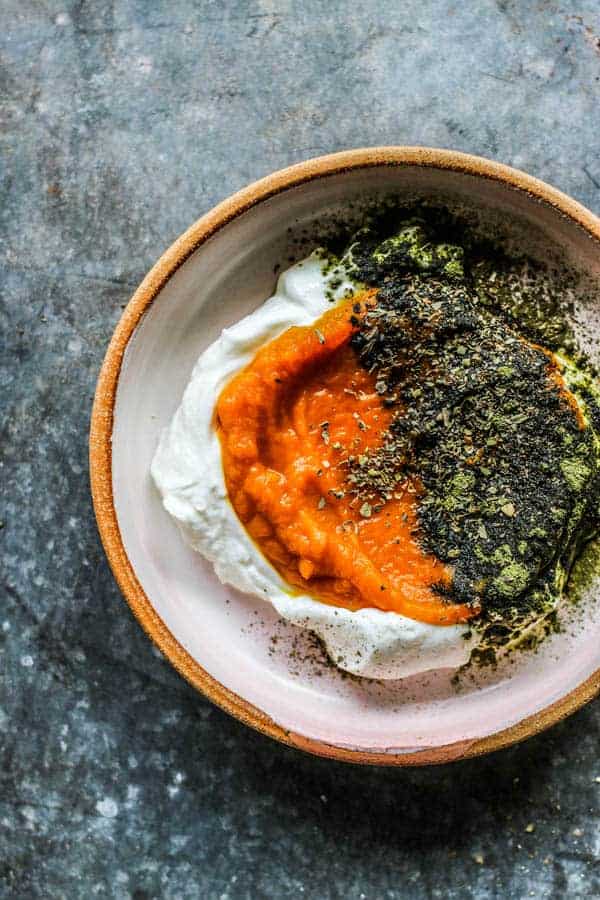
Pumpkin and Yogurt Bowl for Dogs
These yogurt bowls are filled with good for your dog ingredients like plain, fat-free Greek yogurt, 100% pure pumpkin puree, plant-based vitamin and mineral powder, and my Homemade Dog Food Seasoning which is a blend of 5 herbs that have extraordinary health benefits for your dog!
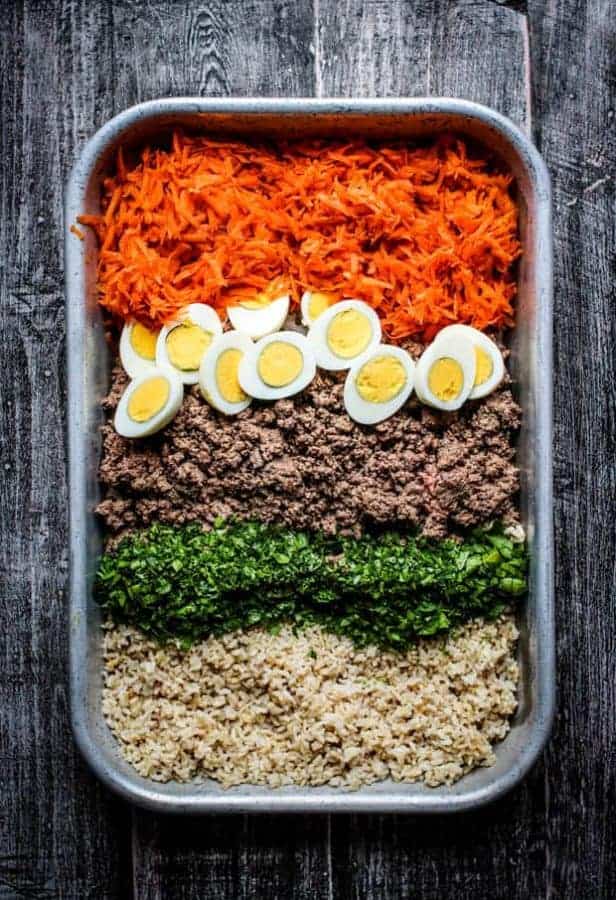
Homemade Dog Food Recipe
It's a fact, feeding your pup a diet of 100% human-grade dog food is easy, cost-effective, and WAY better for them than a traditional doggie diet of processed kibble!
My easy homemade dog food recipe combines lean ground beef, wholesome brown rice, fresh vegetables, hard-boiled eggs, and tender herbs for a healthy, vibrant alternative to traditional dog food that has given our 11-year-old dog a new lease on life!
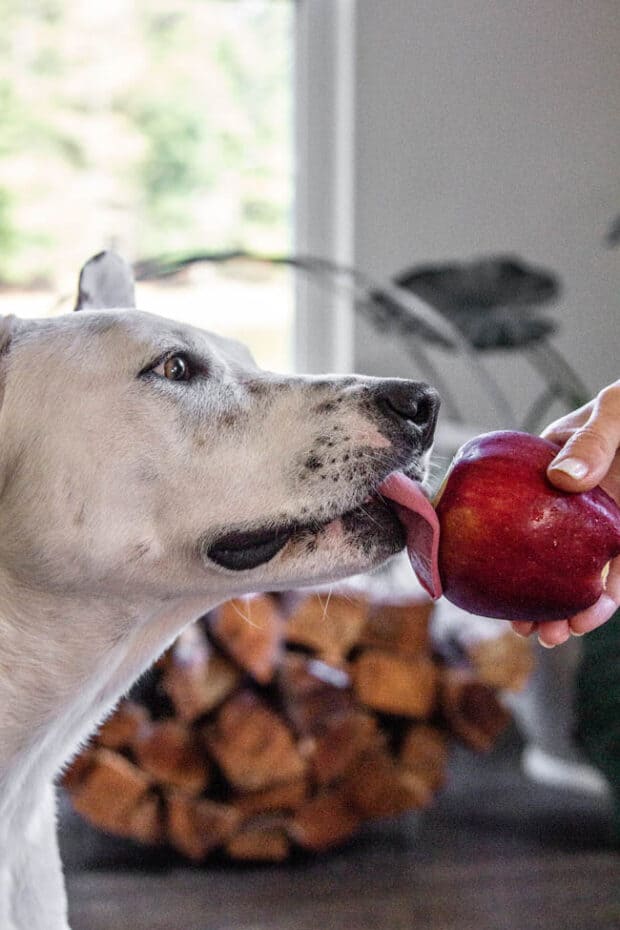
What Fruit Can Dogs Eat? Nature's Dog Treats
We love our dogs and love to pamper them as if they're our own kids.
It's also fun to enjoy a handful of our favorite fruit with them from time to time, especially when they give us those adorable begging eyes.
Click here for a list of dog-friendly fruit!

Can Dogs Eat Bananas?
This simple 3-ingredient dog treat recipe is inspired by homemade banana bread.
These soft dog treats are perfect for dogs that require a softer treat but are actually delicious enough that humans can eat them too. (Of course, the humans around here dip them in maple syrup for themselves. No maple for the dogs though!)
Click here for this banana bread dog treat!
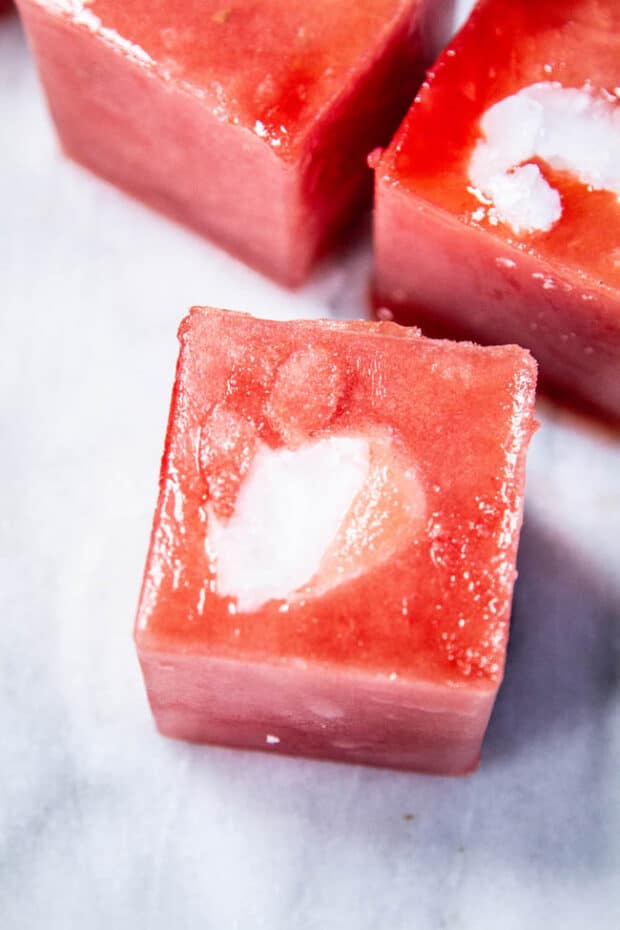
Can dogs eat watermelon?
Can dogs eat watermelon? Of course! There are few treats that dogs enjoy better than a sweet, cold chunk of summer melon.
Click here for this watermelon dog treat recipe!
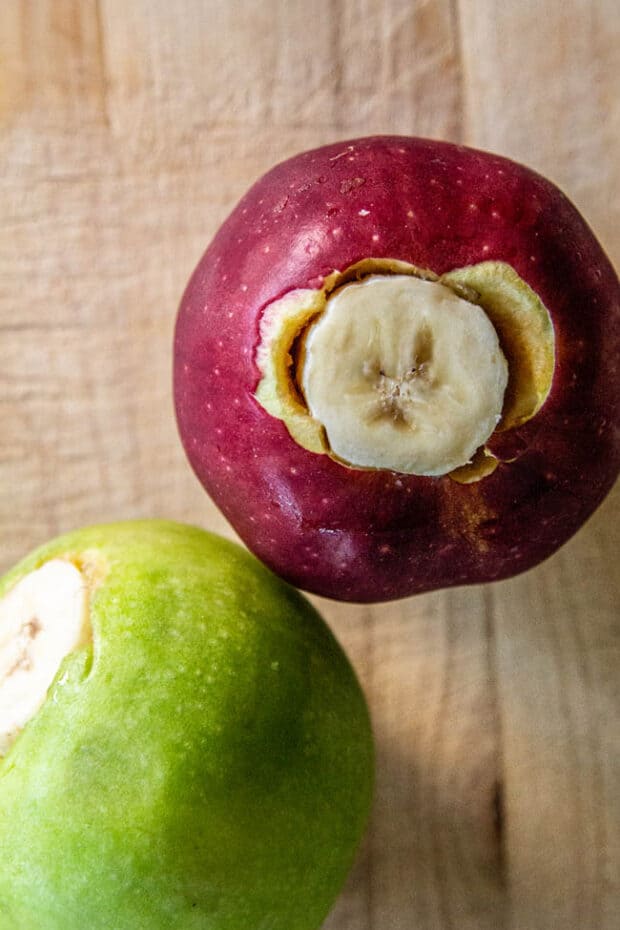
Can dogs eat apples?
This DIY Apple Kong treat is for heavy chewers like our Rebel.
For smaller pups you can feed shredded apple in their food or smaller slices as treats.
Click here for this apple dog treat recipe!

Can dogs eat sweet potato?
Sweet potatoes aren't only great for humans they are an excellent source of vitamins and nutrients for our 4-legged friends as well! Cubed and steamed, mashed, or sliced and dehydrated like this simple treat, there are lots of easy ways to incorporate sweet potatoes into your dog's diet.






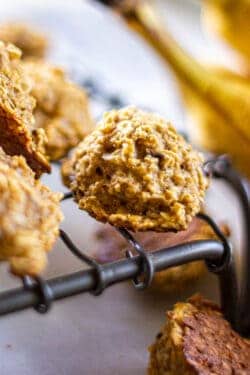
Victoria says
so cute!